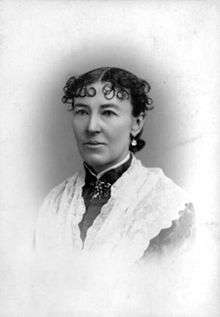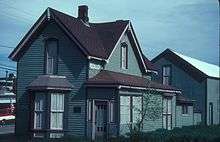Augusta Tabor

Augusta Pierce Tabor (March 29, 1833 – January 30, 1895) was the wife of a merchant and miner, Horace Tabor, the first white woman to live in the Idaho Springs mining camp, and a Denver philanthropist. She was inducted into the Colorado Women's Hall of Fame in 1991 for her contributions to social service and philanthropy.[1]
Early life
Augusta Pierce was born in Augusta, Maine on March 29, 1833.[2][3] Her father, William B. Pierce,[4] owned a quarry[2][3] and was a contractor. Tabor, one of ten children and the third of seven girls, suffered poor health during her childhood.[2] She had a lovely figure, thick dark hair and was determined and charming.[5] Tabor was a debutante, grew up in a pampered lifestyle, and believed in women's rights.[6] She was the cousin of Franklin Pierce, president of the United States.[7]
Adulthood

Augusta and Horace Tabor lived in the Idaho Springs mining camp before moving to Leadville. The Tabors established a store and Augusta made money as a washerwoman and as a landlady to boarders. Horace mined for gold in the mountains of Colorado and in 1878, after 20 years, he struck a silver vein that made US$10,000 (equivalent to $253,586 in 2017) per day.[1]
The Tabors established a mansion in Denver after Horace was elected lieutenant governor later in 1878. The 20-room mansion, built at Eighteenth and Broadway for $40,000 (equivalent to $1,014,345 in 2017), was operated as a boarding house after Horace left her for Elizabeth "Baby Doe" McCourt. Augusta was landlady for up to 14 people at a time and was engaged in community activities, such as contributing to civic projects and charities and hosting fund-raising events. Tabor was particularly involved in the Pioneer Ladies Aid Society.[1]
See also
References
- 1 2 3 "Augusta Pierce Tabor". Colorado Women's Hall of Fame. Retrieved January 22, 2015.
- 1 2 3 Jeanne Varnell (1999). Women of Consequence: The Colorado Women's Hall of Fame. Big Earth Publishing. p. 23. ISBN 978-1-55566-214-1.
- 1 2 "Augusta Tabor" (PDF). History Colorado. Retrieved January 22, 2015.
- ↑ "Augusta Mental Health Institute". Women's History Month, Augusta, Maine. The University of Maine. 2002. Retrieved January 23, 2015.
- ↑ Glenda Riley; Richard W. Etulain (2003). Wild Women of the Old West. Fulcrum Publishing. pp. 12, 15–16. ISBN 978-1-55591-295-6.
- ↑ Glenda Riley; Richard W. Etulain (2003). Wild Women of the Old West. Fulcrum Publishing. pp. 13, 15. ISBN 978-1-55591-295-6.
- ↑ Vivian Sheldon Epstein (November 1, 1997). History of Colorado's Women for Young People. Denver, Colorado: Vivian Sheldon Epstein. p. 10. ISBN 978-1-891424-01-4.
Further reading
- "Augusta Louise Pierce Tabor, Notable Unitarian and Universalist Women". Unitarian Universalist Women's Heritage Society. Archived from the original on 2015-01-24.
- Caroline Bancroft (1991) [1955]. Augusta Tabor, Her Side of the Scandal. Boulder, Colorado: Johnson Publishing Company. ISBN 0933472145.
- Diane C. Major (2013). Augusta Tabor: Enterprising Pioneer. Palmer Lake, Colorado: Filter Press. ISBN 0865411727.
- Betty Moynihan (1988). Augusta Tabor, A Pioneering Woman. Evergreen, Colorado: Cordillera Press. OCLC 17877111.
- Augusta Tabor, Hubert Howe Bancroft (1884). Cabin Life in Colorado. Palmer Lake, Colorado: Filter Press. OCLC 25912042.
A statement recorded at Denver, Oct. 22, 1884, concerning arrival in Colorado, 1859; experiences in mining regions; work with her husband in the Post and Express Office; carrying gold to Denver.
- Linda Wommack. "Augusta Louise Pierce Tabor". From the Grave: A Roadside Guide to Colorado's Pioneer Cemeteries. Caxton Press. p. 97. ISBN 978-0-87004-565-3.
External links
![]()